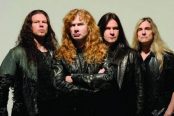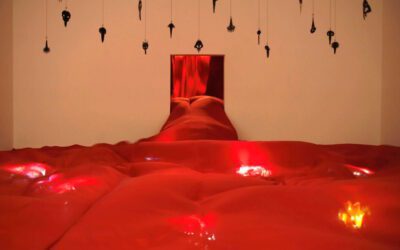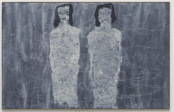If there is a musical equivalent of preservation instinct, it would kick in for most people when jazz and metal meet that most portentious word: fusion.
When the proposition involves just drums, bass and tenor saxophone, it's more terrifying still. Trioscapes' Separate Realities has much to damn it even before a note has been played, much that should, by rights make for cacophony and unrealised concept.
In truth, the album fuses a saxophone aesthetic that is much more indebted to funk than jazz, and we've had funk chops fused with rock riffs for decades now. On a few too many occasions, saxophonist Walter Fancourt wedges funk improvisations into exactly the spot where a wiggy axe-hero might have squeezed in a histrionic guitar solo, if nu-metal hadn't long ago made such flights of self-indulgence a touch comedic.
a wiggy axe-hero might have squeezed in a histrionic guitar solo
We are, as listeners, expected to accept the extended moments of sax-solo dexterity with a grace that wouldn't be expected of the same notes played on an Ibanez or Jackson six-string. That may be a conceit too far, and one which constitutes the lowest points on the album.
Fancourt's dexterity on the saxophone, astounding though it may be, is not astounding within a jazz context. Melodically and tonally, those solos sound stale and safe when compared to, say, David Binney's current work on alto saxophone. Too often they seem the autopilot reactions of a soloist set up with a platform from which to innovate, but instead choosing to display technical ability (his ability to blow harmonics is remarkable, but overused) within a predictable set of patterns. Precisely the sort of musical approach that turned the worst old-school metal into a dull series of filler material bulking out the moments between noodly solos.

And even within that technical ability, there is room for improvement, or at least a missed opportunity to assert something of the instrument's characteristics onto the composition in a way that is really creative. Listening to the range of sounds and effects which Colin Stetson coaxes out of a naked bass saxophone: circular agglomerations of recurrent motifs that mutate and grow in the way that is more usually associated with well-looped electronica; side motifs developed only via harmonics; discrete, gradually coalescing rhythms – it's frustrating to hear as obviously proficient and capable a saxophonist as Harcourt fitting such obvious set-pieces into the gaps he is given by the composition. It sounds polite, tentative, a turn-taking gentleman's agreement not to hog the mic, and it's something of a let-down.
many, many hours of rehearsal time can be heard in just seconds
Nevertheless, those moments aside, there is brilliance here too. And although it is unfair to the drummer Matt Lynch to relegate him to a mere footnote, the brilliance is most notable when Fancourt and bassist Dan Briggs interact and joust with closely-matched motifs. To assume that the busy and challenging free-form structure and dynamic of Separate Realities is a mere cacophony of improvised indulgence is a mistake.
The final minutes of 'Wazzlejazzlebof' dispel that suspicion, with bass and saxophone matching each other so neatly through ascending figures that many, many hours of rehearsal time can be heard in just seconds. Admittedly, the melodic figures are small variations on established arpeggios, but that doesn't make the feat any the lesser.
For Briggs, the album is an interesting outreach into jazz/funk territory, although firmly couched in familiar structures. This is predominantly a rock/metal record, and as such, owes more in its chord progressions and role dynamics to blues than to either funk or jazz. That said, there is much to enjoy, and sufficient inventiveness in each musician's role, and periodic allocations of prominence, to be notable. Zappa is the obvious reference point, except that the metal aesthetic that underlies the record makes for a speedier, heavier approach. That's most notable in Lynch's blast-fills and double-time beats on drums.
The range of Walter Fancourt's tenor saxophone, including the harmonics he blows at will (in themselves the product of solid technical skill) outstrip the frets of any guitar, and it takes a liberal use of the octave pedal to bring those high notes out of Briggs's bass with which he echoes and complements many of Fancourt's melodies. It makes for an interesting effect, certainly more engaging than a six-string played through an octave pedal to approximate a bass guitar's range. Bass, transposed this way, still retains the satisfying audible pop of fingers plucking strings, and fits perfectly into the funk leanings of the record.
The flute motif, played by (Fancourt) in 'Curse of the Ninth' is an effective contrast to the whomping bass licks that accompany it, before a saxophone solo bursts in that, proficient though it is, is just the kind of musical ego-tripping that sometimes mars this record. The song has moments of sultry bass/drum build though,almost as a launchpad for those wiggy solos, but perhaps more compelling in themselves without the histrionics on brass. Like 'Wazzlejazzlebof', the song builds a genuine funk groove that is conspicuous by its absence on some of the other album tracks.
deeply satisfying, technically challenging, verging on bonkers
Essentially though, this is a really fine album. Jazz/Funk/Rock fusion is not without precedent, and it is a notoriously tricky art. Getting the balance between the obvious technical merit of jazz, and the comparatively simple but more melodically/emotionally compelling aspects of rock/metal is a feat that has undone many a fine musician – amongst them Miles Davis, whose 'Splatch'-era experiments with fusion remain deeply unenjoyable to all but the most dogged fans. In Separate Realities, Trioscapes manage to do the near-impossible, producing a record that is deeply satisfying, technically challenging, verging on bonkers, but still, somehow, immediate and essential.
Sure, it's self-indulgent, and has moments ('Celestial Terrestrial Commuters') where it suffers from the inevitable effects of bringing proficient musicians together to jam. It feels like there's a bit of one-upmanship on display at times, but where that gels (and it does so more often than you'd expect), the rewards are all the listener's. Taken against the given assumption that metal fans are likely to be as suspicious of the record as jazz afficionados will, what remains is an album that somehow really, really works. Who'd have thunk it?
On Metal Blade Records from May 8th.
Sean Keenan used to write. Now he edits, and gets very annoyed about the word ‘ethereal’. Likely to bite anyone using the form ‘I’m loving….’. Don’t start him on the misuse of three-dot ellipses.
Divides his time between mid-Spain and South-West France, like one of those bucktoothed, fur-clad minor-aristocracy ogresses you see in Hello magazine, only without the naff chandeliers.
Twitter: @seaninspain
















Liked the review nice to read a review of someone informed. Late in the game but just found it. I am the related to the sax player, ie we share the same name. All the music on CD is written only one short sax solo. Walter is 20 years old. Improv is his thing so this was a big push for him to erad at that speed
. Look for new EP from his main band “The Brand New Life” more of jazz / world / improv. Once more I liked review.